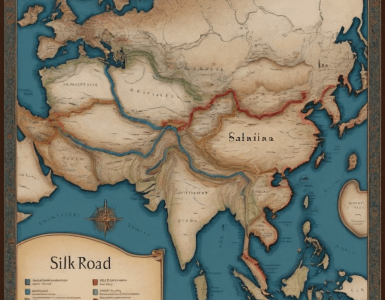L'histoire ne se résume pas à de vieux livres poussiéreux et à des dates ennuyeuses ; c'est un réseau sauvage et interconnecté d'événements et d'influences qui façonnent le monde dans lequel nous vivons aujourd'hui. Nous voyons souvent de grands récits - guerres, empires, révolutions - mais ce qui est vraiment fascinant, ce sont les liens surprenants, les poignées de main cachées entre des pratiques culturelles et des événements historiques apparemment sans rapport. Jetons un coup d'œil à quelques liens inattendus, parsemés de faits étranges et d'origines méconnues.
L'impact étonnamment explosif de la pomme de terre
Pensez à la pomme de terre. Cela semble assez banal, n'est-ce pas ? Ce n'est pas le cas. Cette humble patate a joué un rôle étonnamment central dans l'histoire de l'Europe. Son introduction en provenance des Amériques a complètement remodelé la démographie et la structure sociale de l'Europe. Avant l'arrivée de la pomme de terre, le régime alimentaire de nombreuses régions d'Europe était très limité, ce qui entraînait de fréquentes famines. Le rendement élevé et la valeur nutritionnelle de la pomme de terre ont permis l'explosion démographique, exerçant une pression sans précédent sur les terres et les ressources, ce qui a sans doute contribué aux conditions qui ont conduit à la Révolution française. Qui aurait cru qu'un légume-racine pouvait être aussi révolutionnaire ?
Fait curieux : les premiers adeptes de la pomme de terre en Europe se sont parfois heurtés à des résistances. Certains pensaient qu'elle provoquait la lèpre ou d'autres maladies, ce qui a entraîné une lenteur dans l'adoption de la pomme de terre. Il a fallu du temps pour que la pomme de terre se défasse de sa réputation d'"aliment du pauvre".
L'héritage inattendu des croisades
Les croisades, ces guerres de religion sanglantes, ont laissé un héritage bien au-delà du champ de bataille. Bien que l'on se souvienne souvent de leur violence, les croisades ont involontairement favorisé d'importants échanges culturels. Les Européens ont découvert de nouveaux aliments, de nouvelles épices et de nouvelles technologies au Moyen-Orient. Les humbles pâtes, par exemple, sont probablement arrivées en Italie par ces routes, transformant complètement la cuisine italienne. Les croisés ont également ramené les chiffres arabes, qui ont remplacé les encombrants chiffres romains et révolutionné les mathématiques et le commerce. Alors, la prochaine fois que vous dégusterez un plat de spaghettis, ayez une pensée pour les chevaliers médiévaux qui les ont amenés par inadvertance à votre table.
Fait étrange : les interactions des croisés avec l'Orient ont également favorisé la propagation de certaines maladies, qui ont eu des répercussions imprévues sur la démographie européenne. La peste noire, par exemple, aussi dévastatrice qu'elle ait été, pourrait avoir eu des itinéraires liés aux croisades et à leur interaction avec l'Asie centrale.
L'influence surprenante du café sur l'illumination
Le café, un lieu de rencontre sociale apparemment simple, a joué un rôle étonnamment important au siècle des Lumières. Il s'agissait d'espaces où les intellectuels, les philosophes et les artistes pouvaient se rencontrer, débattre et échanger des idées en toute liberté. Les cafés sont devenus des centres officieux d'apprentissage et de discussion, favorisant une atmosphère intellectuelle dynamique qui a alimenté les idées révolutionnaires du Siècle des Lumières. Pensez-y : les fondements de la pensée moderne alimentés par la caféine !
Fait curieux : les premiers cafés n'étaient pas seulement des lieux de discussion intellectuelle, mais aussi des centres de transactions commerciales et d'intrigues politiques. Certains fonctionnaient même comme des bourses informelles.
Le lien inattendu entre la piraterie et la langue anglaise
La piraterie, souvent considérée comme une activité anarchique, a eu un impact inattendu sur la langue anglaise. Les pirates, qui constituent un groupe hétérogène de personnes naviguant aux quatre coins du monde, ont eu de nombreux échanges. Le mélange de langues et d'argot au sein de ce groupe international a contribué à l'évolution de l'anglais, entraînant des ajouts et des modifications de vocabulaire, imprégnant la langue de termes nautiques et d'argot que nous utilisons aujourd'hui.
Fait étrange : de nombreuses expressions pirates populaires, telles que "Shiver me timbers" et "Avast ye", n'ont jamais vu le jour à l'âge d'or de la piraterie, mais ont été concoctées bien plus tard par des écrivains romançant la vie de marin.
L'impact durable de la route de la soie Au-delà de la soie
La route de la soie, célèbre pour la soie luxueuse qu'elle transportait, a facilité bien plus que le simple commerce. Ce vaste réseau de routes reliait l'Orient et l'Occident, favorisant l'échange d'idées, de technologies, de religions et de cultures. Le bouddhisme s'est répandu de l'Inde à la Chine le long de la route de la soie, tandis que l'islam a fait son chemin vers l'Orient. La transmission des techniques de fabrication du papier de la Chine à l'Occident a profondément influencé le développement de l'imprimerie et la diffusion de l'alphabétisation. La route de la soie n'était pas seulement une route commerciale, mais une artère cruciale d'échanges culturels qui a façonné les civilisations de toute l'Eurasie.
Fait étrange : la route de la soie n'était pas une route unique et bien définie, mais un réseau complexe d'itinéraires entrelacés, évoluant au fil du temps en fonction de facteurs politiques et environnementaux.
Les conséquences inattendues de l'imprimerie
On attribue souvent à la presse à imprimer de Gutenberg le mérite d'avoir ouvert la voie à la Renaissance et à la Réforme. Cette invention, qui a permis la production de livres en masse, a rendu l'information beaucoup plus accessible au grand public. Cette accessibilité a eu de profondes conséquences sociales et politiques. L'essor de l'alphabétisation a remis en question la structure du pouvoir établi par l'Église, entraînant une remise en cause généralisée de la doctrine religieuse et l'apparition de nouveaux mouvements religieux et politiques. La diffusion d'idées par le biais de livres imprimés a contribué à créer une citoyenneté mieux informée et plus engagée, jetant ainsi les bases de la démocratie moderne.
Fait curieux : les premiers livres imprimés étaient souvent coûteux et n'étaient pas immédiatement accessibles à tous. Les bibliothèques et les riches mécènes ont joué un rôle essentiel dans la diffusion du savoir.
Conclusion
L'histoire est une tapisserie tissée à partir d'innombrables fils, et ces fils sont souvent étonnamment interconnectés. De la contribution d'une humble pomme de terre à la révolution à l'impact involontaire de la piraterie sur la langue, l'histoire révèle les façons inattendues dont des événements et des pratiques culturelles apparemment isolés s'influencent mutuellement et façonnent le monde qui nous entoure. L'exploration de ces liens cachés permet non seulement d'enrichir notre compréhension du passé, mais aussi d'éclairer notre présent. La prochaine fois que vous rencontrerez quelque chose de familier, cela vaudra peut-être la peine de considérer ses origines historiques surprenantes et souvent ignorées !

























Ajouter un commentaire